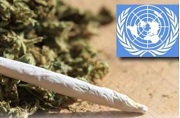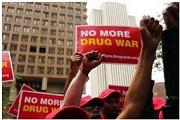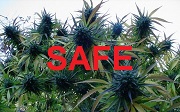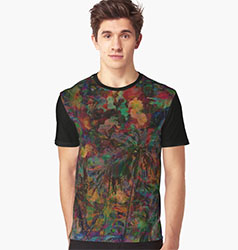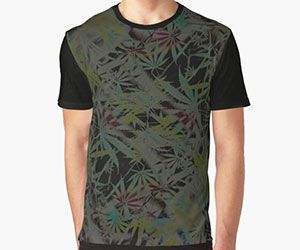Commission Wants UN to Adopt Alternative Drug Policies
The United Nations has a golden opportunity to promote alternate approaches to global drug policy next month when it meets in New York for a special session, but a high-profile commission said Friday that the work leading up to the meeting has so far been disappointing....
State Department Official Gives Green Light for Countries to Decriminalize Drugs
Washington’s top international narcotics official gave a qualified go-ahead for countries to decriminalize drugs on Tuesday — the latest sign that the US is walking back decades of hardline rhetoric ahead of a pivotal special session of the...
Debunked Study About Medical Marijuana Laws and Underage Use
It’s one of the main questions voters ask when they consider a cannabis measure: Will legalization — whether medical or adult use — encourage more kids to get high?
With some form of legalization expected on at least a half-dozen state ballots this November, data showing increased or decreased use by minors will likely be a powerful weapon in the battle for votes.
That’s why a study published by the International Journal of Drug Policy earlier this week is worth noting. In it, researchers at Columbia University debunked a 2015 report that indicated medical marijuana laws could cause an increase in underage cannabis use. Using the same data analyzed in the earlier report, the Columbia team found “no evidence of a differential increase in past-month marijuana use in youth” that could be attributed to state medical marijuana legalization.
What’s going on here? Is this a he-said, she-said situation, or is there something more to the story?
Here’s what a hard look at the data and analysis reveals.
Last year’s study, conducted by Lisa Stolzenberg of Florida International University and also published in the International Journal of Drug Policy, found that “medical cannabis laws amplify recreational juvenile cannabis use.” The study found traction mostly among prohibitionist groups like Project SAM, which featured Stolzenberg’s conclusion on its website.
The Stolzenberg study was curious, though, because it ran contrary to previous research looking at similar data. Those studies found no difference in the prevalence of adolescent cannabis use before or after the passage of medical marijuana laws.

Here’s Why Cannabis Legalization Doesn’t Lead to Higher Teen Use Rates
Puzzled by the contradiction, the Columbia University team, led by Melanie Wall at the Mailman School of Public Health, took the same data set analyzed by Stolzenberg and tried to replicate her results. They couldn’t.
“Careful assessment of the analytical strategy” employed by Stolzenberg, Wall reported, indicated that the earlier conclusions were “the result of a biased comparison and thus, the conclusions of Stolzenberg et al. are not supported by the data.”
Here’s what happened. It’s pretty simple, actually.
In the 2015 study, Stolzenberg compared underage cannabis use in medical marijuana states to states where medical use remained illegal. What went unmentioned in her study was the fact that MMJ states already had higher rates of underage cannabis use prior to the passage of MMJ laws. In other words, more adolescents were using cannabis in Michigan than in, say, Iowa, even prior to the passage of Michigan’s MMJ law. By comparing the adolescent use rate in Michigan after the passage of MMJ to the use rate in a non-MMJ state like Iowa, Stolzenberg concluded that MMJ laws “amplified” recreational juvenile cannabis use.
The Columbia University team characterized that, tactfully, as a “biased comparison.” An appropriate analysis, they wrote, would compare adolescent use within the same state prior to passage of MMJ laws, and after passage. “Stolzenberg,” they wrote, “did not make this comparison.”
In fact, the Columbia team found “there is no evidence of a significant difference in youth marijuana use” after a state passes medical marijuana laws. Between 2002 and 2011 — the time period that Stolzenberg studied — some underage use increased, some decreased, and some remained the same. In Arizona, underage use increased 0.9 percent after MMJ laws went into effect. In Michigan, underage use remained the same. In Montana, underage use declined 2.5 percent. Overall, underage use declined 0.1 percent after the adoption of medical marijuana laws in the eight states that legalized medical use between 2002 and 2011.
The Florida International University study, the Columbia team reported, “is simply not substantiated by appropriate analysis of the data.”
A question to the Australian government; where is your argument ?
The war on drugs in not really a war on drugs, as a war on cannabis, which is not a drug, but a herb. Which is like saying, lets have a war on air or water or that plant over there.
In my mind, a war is not really a war unless retaliation is involved, and for the past 50 years cannabis users have not violently retaliated. Rebelled, yes, but not been violent.
The war on drugs (mainly cannabis) can never be won by violence and force, it's like "trying to catch the wind".... maybe that's not a good analogy, but hey, a great song by Donovan!
But lets get serious now; not only can it not be won, it's cost the people, taxpayers, billions and billions of dollars, every year.(worldwide)
Money that could be far more wisely spent on education and creating employment.
Now that being said, why is there a war on cannabis anyway?
Harvard university professor, yes that's Harvard, the top university in the world!
Dr. Lester Grinspoon, Associate Professor Emeritus of Psychiatry at Harvard Medical School. Grinspoon was also senior psychiatrist at the Massachusetts Mental Health Center in Boston for 40 years. Dr. Grinspoon is a fellow of the American Association for the Advancement of Science and the American Psychiatric Association. He was founding editor of the The American Psychiatric Association Annual Review and the Harvard Mental Health Letter. Grinspoon was editor of the Harvard Mental Health Letter for fifteen years.
Pretty good credentials?
says that cannabis does definitely not cause Schizophrenia!
And he explains his case very clearly;
Through the data collected, Schizophrenia has always remained at a constant 1% of the population, whilst cannabis uses has skyrocketed since the 1960's.
Hence, the two have no correlation.
http://www.medicalmarijuana.com.au/medical-marijuana/medical-cannabis/the-culture-high-schizophrenia-cannabis-marijuana
second point;
after many years of research, professor David John Nutt DM FRCP FRCPsych FMedSci is a British psychiatrist and neuropsychopharmacologist specialising in the research of drugs that affect the brain and conditions such as addiction, anxiety and sleep. He was until 2009 a professor at the University of Bristol heading their Psychopharmacology Unit. Since then he has been the Edmond J Safra chair in Neuropsychopharmacology at Imperial College, London. Nutt was a member of the Committee on Safety of Medicines, and was President of the European College of Neuropsychopharmacology. His book "Drugs without the hot air" (UIT press) won the Transmission Prize for Communicating Science in 2014
Blah blah blah etc etc....Professor Nutt was employed by the British health department to analyse the dangers of illegal drugs, such as cannabis (it's a herb)
After many years of diligent study and research, he submitted his findings to the government, stating cannabis was one of the safest herbs in existence, far safer than alcohol or tobacco.
As we know now, to the contrary, it actually has medicinal benefits.
The next week, Professor Nutt was dismissed, with the explanation that his results contradicted the policies of the British government.
https://en.wikipedia.org/wiki/David_Nutt
Third point:
The Us Department of Transportation commissioned several independent studies on the danger of driving on cannabis; http://www.medicalmarijuana.com.au/images/feedgator/images/pdf/Drug_and_Alcohol_Crash_Risk.pdf
the results were negligible.
and finally the forth point and something ignorant fools have being screaming out for years.
The Gateway Theory, that cannabis is the stepping stone (excuse the pun) to dangerous drugs.
Notice I didn't say more dangerous, because cannabis is medicine, however you look at it. You can't overdose on cannabis!
A recent study conducted by the University of Victoria (Canada) and published in Drug and Alcohol Review. It further confirms what is already known to anyone willing to examine the current research: marijuana is not a gateway drug, and can actually serve as a "reverse gateway,” an agent to be utilized as treatment for alcoholism and hard/prescription drug addiction.
This study analyzed data from a national survey of Canadian pot patients. Of the 473 adults questioned, 87 percent reported using weed as a substitute for alcohol, prescriptions and illegal hard drugs. Specifically, 80 percent subbed pot for Rx medication, 52 percent for booze and 33 percent for illicit drugs. These numbers substantiate a 2009 US study of Berkeley Patients Group members that likewise found a majority of medical marijuana patients used cannabis as an alternative to unhealthy, addictive substances.
http://www.medicalmarijuana.com.au/growing/medical-cannabis/hoorah-death-to-the-gateway-theory
So considering the above evidence, from the esteemed academia mentioned above.
Where is your argument, why is cannabis illegal, why can't responsible adults self-medicate with this wonder herb?
Now I'm not willing to debate the above, references/links are there under each point, scientific proof. But for any government official or academic who's willing, I'll do my best to organise debate with the above mention academics. Lester Grinspoon, David Nutt, etc.
Latest
Coronavirus Strikes Massachusetts Cannabis Company Employees
Reassessing the Essential: Cannabis in the Time of a Pandemic
5 Reasons To Try Aspen Valley CBG Flower (30% Off)
High Times Cannabis Cups Go Virtual In Wake Of Coronavirus Pandemic
Drug Enforcement Administration Proposes Plan To Expand Cannabis Research
Ghana Legalizes Cannabis For Medicinal And Industrial Uses
The cheapest legal weed in Canada: Discover these cannabis ‘value brands’
Cannabis and coronavirus: Here’s what you need to know
cannabis designs
The Best Of
WHO Rules CBD Should Not Be a Scheduled Drug

Dr Cristina Sanchez PhD video interview on medical marijuana and cancer

Biochemist Dennis Hill interview; Cannabis oil as a cure for cancer.
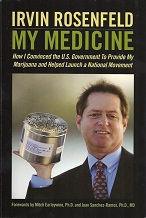
The unofficial World Record holder for cannabis smoking part 1



